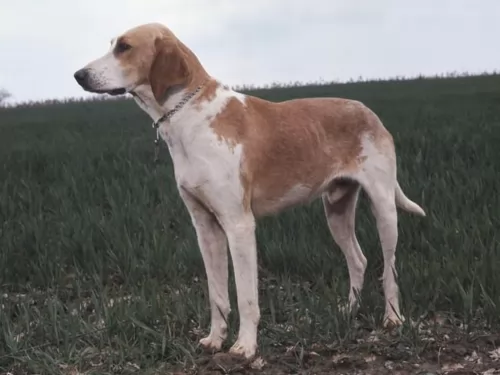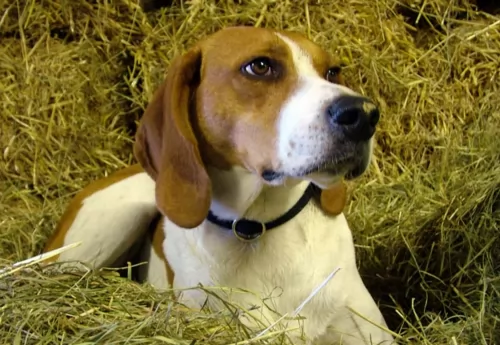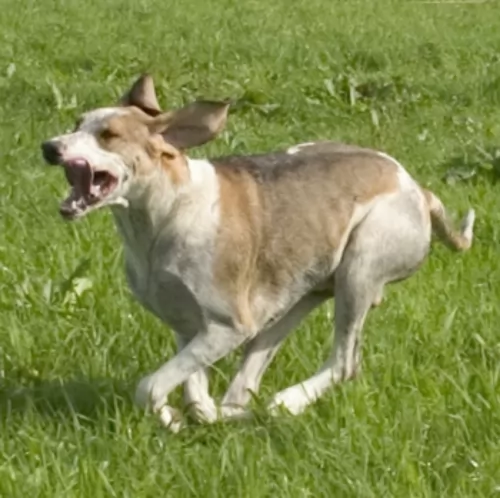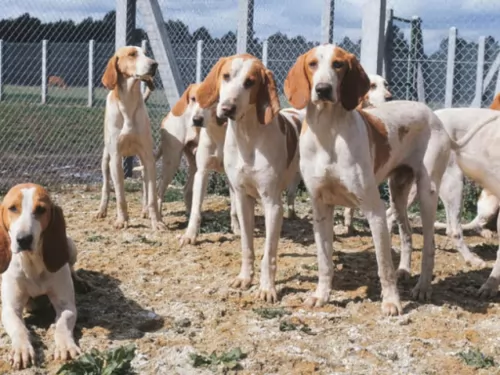 Petzlover
Petzlover Bluetick Beagle is originated from United Kingdom but Grand Anglo-Francais Blanc et Orange is originated from France. Bluetick Beagle may grow 29 cm / 11 inches shorter than Grand Anglo-Francais Blanc et Orange. Bluetick Beagle may weigh 24 kg / 52 pounds lesser than Grand Anglo-Francais Blanc et Orange. Bluetick Beagle may live 3 years more than Grand Anglo-Francais Blanc et Orange. Both Bluetick Beagle and Grand Anglo-Francais Blanc et Orange has almost same litter size. Both Bluetick Beagle and Grand Anglo-Francais Blanc et Orange requires Low Maintenance.
Bluetick Beagle is originated from United Kingdom but Grand Anglo-Francais Blanc et Orange is originated from France. Bluetick Beagle may grow 29 cm / 11 inches shorter than Grand Anglo-Francais Blanc et Orange. Bluetick Beagle may weigh 24 kg / 52 pounds lesser than Grand Anglo-Francais Blanc et Orange. Bluetick Beagle may live 3 years more than Grand Anglo-Francais Blanc et Orange. Both Bluetick Beagle and Grand Anglo-Francais Blanc et Orange has almost same litter size. Both Bluetick Beagle and Grand Anglo-Francais Blanc et Orange requires Low Maintenance.
 Among the hound group of dogs, there are some ancient breeds. The history of the Beagle and the Bluetick Beagle more specifically is fairly uncertain as breeds as we know them today didn't really develop until the 19th century. It was in the mid-1800s the Reverend Phillip Honeywood established Beagles in Essex, England and American breeders started importing Beagles from England to improve the looks of their own dogs. The breed was developed from a number of breeds and possibly the Bluetick Coonhound had some input into the markings of the Bluetick Beagle.
Among the hound group of dogs, there are some ancient breeds. The history of the Beagle and the Bluetick Beagle more specifically is fairly uncertain as breeds as we know them today didn't really develop until the 19th century. It was in the mid-1800s the Reverend Phillip Honeywood established Beagles in Essex, England and American breeders started importing Beagles from England to improve the looks of their own dogs. The breed was developed from a number of breeds and possibly the Bluetick Coonhound had some input into the markings of the Bluetick Beagle.
Today the American Kennel Club recognizes many colors and color combinations in Beagles. with white, tan and black being the more common color. Beagles can also sport ‘markings’ such as blue and red freckles or ticks. If there are black ticks, it can be referred to as blue-ticked.
 The Grand Anglo-Français Blanc et Orange is one of three Grand Anglo-Français breeds. The dogs comes from crossing French scenting hounds with English Foxhounds way back in the 19th century.
The Grand Anglo-Français Blanc et Orange is one of three Grand Anglo-Français breeds. The dogs comes from crossing French scenting hounds with English Foxhounds way back in the 19th century.
The sporting dog is rare, believing to be be pretty much confined to their country of origin – France. It is recognized in France by the French Kennel Club and also internationally by the Federation Cynologique Internationale. Since 2006, they have been recognized by the UKC and are thought to be kept essentially as a working dog as opposed to being kept as a companion dog.
 The Bluetick Beagle is a small sized hunting dog. As part of the Hound group of dogs, he has an excellent sense of smell. He has always been used as a hunting dog, and it is why this particular dog is a popular choice for law enforcement agencies – it’s that keen sense of smell.
The Bluetick Beagle is a small sized hunting dog. As part of the Hound group of dogs, he has an excellent sense of smell. He has always been used as a hunting dog, and it is why this particular dog is a popular choice for law enforcement agencies – it’s that keen sense of smell.
He is lean and compact with muscular legs, a broad head, fairly long floppy ears and a broad chest. His coat is short-haired and smooth and its the short blue coloration in his coat sets the Bluetick Beagle apart from the regular Beagle.
The Blue Tick Beagle can have a bit of a stubborn streak, but be that as it may, he still responds well to training and socialization. Alert, he has an amicable nature, and this is what makes this breed such a great family pet He’ll get on well with children in the house as well as with other pets.
The Blue Tick Beagle isn’t an aggressive dog breed. He is lively and playful and full of energy and will require you taking him on walks, runs in the park and lots of games at home.
He loves the companionship of his human family and can’t just be left in the back yard on his own for long periods of time. He can suffer with separation anxiety and also become bored and then he starts with long, mournful howls.
 The lean, muscular Grand Anglo-Français Blanc et Orange is a large, powerful dog standing at 60 – 70cm at the withers and weighing 30 to 36 kg.
The lean, muscular Grand Anglo-Français Blanc et Orange is a large, powerful dog standing at 60 – 70cm at the withers and weighing 30 to 36 kg.
He has a short, broad head with a broad, flat skull. He has long legs, a long tail and long, floppy ears. His coat is white with orange markings. These dogs are instinctive hunters with a superb sense of smell and the ability to track their prey for miles.
Sociable, independent, loving and loyal, the Grand Anglo-Français Blanc et Orange can become attached to his owner. He doesn't want to be left alone for long periods of time, becoming bored and destructive.
Training and socialization is excellent for your dog, making him obedient and also more relaxed when you're not there.While he is patient and good with children, if you're looking for a playful pet, this dog wouldn't come as recommended for children, as his heart longs to just be outside on the hunt.
 Your Blue Tick beagle is an active, cheerful dog and he makes a good companion for adult or child. He is fairly adaptable and can happily fit into a home in the city- or country. A Blue Tick Beagle doesn’t want to be left alone day after day, so think about your work commitments before you buy buy your Blue Tick and leave him alone.
Your Blue Tick beagle is an active, cheerful dog and he makes a good companion for adult or child. He is fairly adaptable and can happily fit into a home in the city- or country. A Blue Tick Beagle doesn’t want to be left alone day after day, so think about your work commitments before you buy buy your Blue Tick and leave him alone.
Being a hound, although he is gentle and amicable, he can also be stubborn which means he will require some patient training. Because he is a scenthound, he is inclined to catch an aroma and want to go after it, so you’ll need a well fenced garden to keep him in.
Other than that when he is with you, he makes a dedicated and loving companion.
 The Grand Anglo – Francais et Orange has always been a pack dog and used to being social. He will get on well with his entire human family as well as with any other pets in the home.
The Grand Anglo – Francais et Orange has always been a pack dog and used to being social. He will get on well with his entire human family as well as with any other pets in the home.
The Grand Anglo-Francais Blanc et Orange is a loyal dog, and when trained he becomes an excellent companion. He is patient with children, but doesn't make a particularly great playmate as he has a more serious personality.
The Grand Anglo-Francais Blanc et Orange is a dog that has been specifically developed to hunt, so ensure that he gets a good amount of exercise. While he is essentially a dog that loves working in a pack, he can still make his human family a loving and devoted pet.
 Beagles are healthy dog breeds, and with good care, can enjoy an average lifespan of between 12-15 years. Like many other dogs, the Blue Tick beagle is more prone to a number of medical conditions, and more so as it ages. It is essentially a hardy breed that won’t require any particular special care, but common dog problems such as hip dysplasia and skin allergies will need to be watched.
Beagles are healthy dog breeds, and with good care, can enjoy an average lifespan of between 12-15 years. Like many other dogs, the Blue Tick beagle is more prone to a number of medical conditions, and more so as it ages. It is essentially a hardy breed that won’t require any particular special care, but common dog problems such as hip dysplasia and skin allergies will need to be watched.
There are always some health concerns with every dog breed that every dog owner needs to be aware of. Dog with floppy ears such as what the Blue Tick Beagle has will always be prone to ear infections. The ears will need to be kept clean but you can’t just go prodding around in a dog’s ear as you could damage the ears. A visit to the veterinarian will clear up any ear problems.
This particular condition - prolapse of the gland of the nictitating membrane – is important to clear up quickly as it could lead to more serious problems. The longer the third eyelid gland is problematic, the more irritated and inflamed it becomes.
 Capable of reaching 10 to 12 years in age, you won't really find any particular health issues with this dog. He is a fairly healthy dog and will be able to reach a good age with good nutrition, exercise, love and care.
Capable of reaching 10 to 12 years in age, you won't really find any particular health issues with this dog. He is a fairly healthy dog and will be able to reach a good age with good nutrition, exercise, love and care.
Because of the long, floppy ears, you want to be checking inside the ears. As a hunting scentdog, he will chase his prey through water if needs be, and damp ears can encourage bacteria.
Ear infections are common in most dogs, and you'll notice your pet scratching and rubbing at his ear and even shaking his head. You may also notice swelling or redness. Veterinary intervention will be necessary.
If your dog's ear infection has cleared up, you can maintain the health of the ear by cleaning them with a gentle cleanser and cotton wool. There is always caution when cleaning a dog’s ear, and rupturing the ear drum is one. Be careful, and if you're not sure, rather make an appointment with your vet to have his ears cleaned.
 A good, nutritious diet will help your Blue Tick Beagle steer clear of ill health. He is an energetic breed so will require either home prepared food or commercially manufactured dog food with the right mix of vitamins and minerals to keep his energy levels up.
A good, nutritious diet will help your Blue Tick Beagle steer clear of ill health. He is an energetic breed so will require either home prepared food or commercially manufactured dog food with the right mix of vitamins and minerals to keep his energy levels up.
As mentioned, your BlueTick can be prone to hip dysplasia and skin allergies so a supplement which includes omega 3 is an excellent choice for your dog’s overall health. Make sure to include some raw meat into your dog’s diet and always ensure a constant supply of fresh water.
Your Bluetick Beagle isn’t a huge shedder with his short-haired coat, but he will need to be brushed at least twice a week to keep his coat in tip-top condition and to remove all those loose hairs. Bathing a dog is never encouraged as it removes the dogs natural oils, but of course there are always exceptions when a dog will require a bath.
 As a scenthound, your Grand Anglo-Français Blanc et Orange loves being outdoors and following a scent trail. These dogs therefore are better suited to life in the countryside as opposed to life in the city. Make sure you provide him with plenty of exercise – walks, swimming and running with you when you go cycling or jogging. Include ball- and rope games too.
As a scenthound, your Grand Anglo-Français Blanc et Orange loves being outdoors and following a scent trail. These dogs therefore are better suited to life in the countryside as opposed to life in the city. Make sure you provide him with plenty of exercise – walks, swimming and running with you when you go cycling or jogging. Include ball- and rope games too.
Your orange and white scent dog will thrive on you taking time out for him to brush his short coat twice a week and to also check for fleas and ticks at the same time.
Looking forward to his food, your energetic Grand Anglo-Français Blanc et Orange will require a high quality commercially manufactured food. Make sure that you buy the best brands to ensure your pet gets his vitamins and minerals in instead of just a lot of fillers, colorants and preservatives.
Many dog owners prefer giving their dogs several smaller meals throughout the day as opposed to one or two large meals. With his dry kibble you can add in some raw meat from time to time as well as cooked brown rice, cooked chicken and vegetables. See that he has access to a constant supply of fresh, cool water.